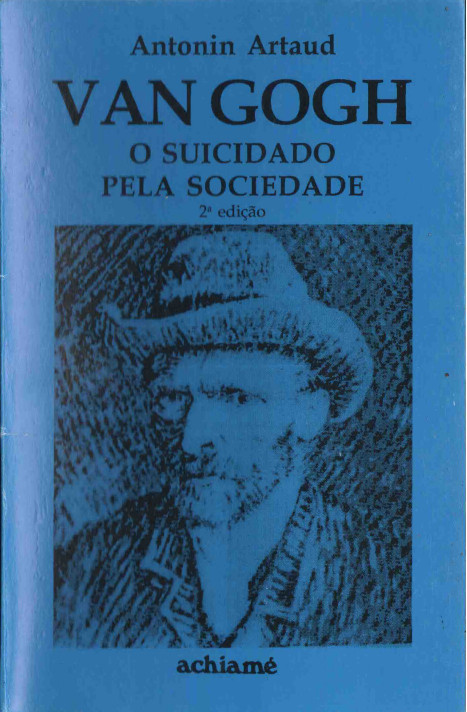Antonin Artaud: Van Gogh, the Suicide Provoked by Society (1947-) [English, Portuguese]
Filed under booklet | Tags: · madness, psychiatry

Artaud’s essay on van Gogh was awarded the renown Prix Sainte-Beauve. He wrote the piece in 1946 after being released from a mental asylum in Rodez, France, where he had undergone extensive electro-shock treatment.
“Fifteen years before Michel Foucault, Artaud affirms that madness has been created by psychiatric medicine and not the other way around. He accuses doctors and Van Gogh’s brother Theo, to have, not only ignored, but actively suppress the expression of the painter’s art.” (source)
Originally published as Van Gogh, le Suicidé de la Société, Paris, 1947
English excerpts published in Horizon, January 1948, pp 46-50
Translated by Peter Watson
radio adaptation by André Almuró, with commentary (Continuo)
Van Gogh, the Suicide Provoked by Society (English, excerpts, trans. Peter Watson, 1948)
Van Gogh, o Suicidado pela Sociedade (Portuguese, 2nd edition)
Andreas Killen: Berlin Electropolis: Shock, Nerves, and German Modernity (2006)
Filed under book | Tags: · 1880s, 1890s, 1900s, 1910s, berlin, city, electricity, germany, history, modernity, neurasthenia, psychiatry, telephone, weimar republic

“Berlin Electropolis ties the German discourse on nervousness in the late nineteenth and early twentieth centuries to Berlin’s transformation into a capital of the second industrial revolution. Focusing on three key groups—railway personnel, soldiers, and telephone operators—Andreas Killen traces the emergence in the 1880s and then later decline of the belief that modernity caused nervous illness. During this period, Killen explains, Berlin became arguably the most advanced metropolis in Europe. A host of changes, many associated with breakthroughs in technologies of transportation, communication, and leisure, combined to radically alter the shape and tempo of everyday life in Berlin. The resulting consciousness of accelerated social change and the shocks and afflictions that accompanied it found their consummate expression in the discourse about nervousness.”
Wonderfully researched and clearly written, this book offers a wealth of new insights into the nature of the modern metropolis, the psychological aftermath of World War I, and the operations of the German welfare state. Killen also explores cultural attitudes toward electricity, the evolution of psychiatric thought and practice, and the status of women workers in Germany’s rapidly industrializing economy. Ultimately, he argues that the backlash against the welfare state that occurred during the late Weimar Republic brought about the final decoupling of modernity and nervous illness.
Publisher University of California Press, 2006
Weimar and Now: German Cultural Criticism, Volume 38
ISBN 0520931637, 9780520931633
303 pages
review (Eric J. Engstrom, H-German)
review (Harry Oosterhuis, History of Psychiatry)
Myron Sharaf: Fury on Earth: A Biography of Wilhelm Reich (1983)
Filed under book | Tags: · biography, orgonomy, psychiatry, psychoanalysis, psychology, sex

In this book, Myron Sharaf explodes the myths that have collected around the name “Wilhelm Reich”–the psychoanalytic myth of the early brilliant Reich, and the later insane Reich of orgone energy; the Marxist myth of the radical Reich, and the conservative myth of the Republican Reich. Sharaf’s Reich is profoundly human: complex and contradictory, a generous, loving person capable of extraordinary bursts of bizarre ideas and impassioned cruelty. Of particular interest are the illuminations of the relationship between Reich’s childhood traumas and his major concepts; and the pivotal personal and scientific significance of Freud for Wilhelm Reich.
In 1944, Sharaf met Reich and for the next decade, as student, patient, and coworker, kept careful notes toward the eventual preparation of this biography. He has interviewed Reich’s colleagues, family, friends and enemies, and gathered important papers. From these many sources he has discovered significant unpublished connections between Reich’s personality, his social-intellectual milieu, and his work.
Publisher St Martin’s Press, New York, 1983.
ISBN 0312313705
550 pages
PDF (1983 edition)
PDF (2011 edition, without photographs)

